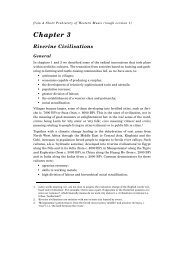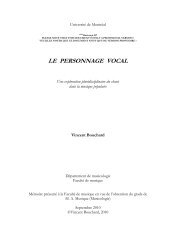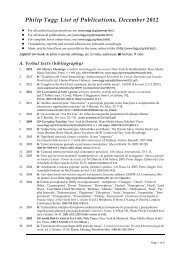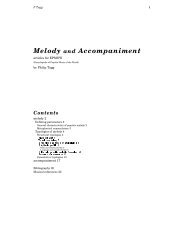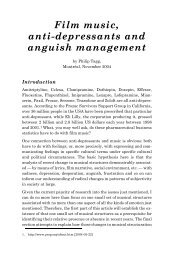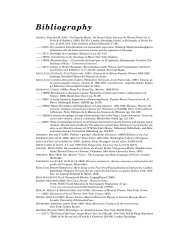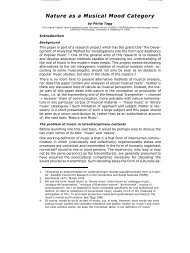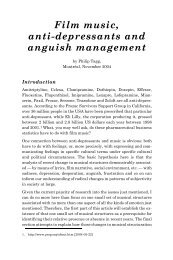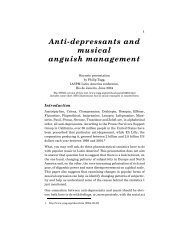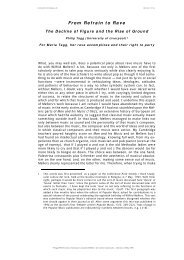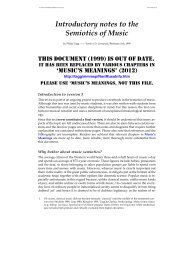interviews with library music producers - Philip Tagg
interviews with library music producers - Philip Tagg
interviews with library music producers - Philip Tagg
You also want an ePaper? Increase the reach of your titles
YUMPU automatically turns print PDFs into web optimized ePapers that Google loves.
8 P <strong>Tagg</strong>: The Mood Music Libraries<br />
sort of picture’.<br />
This is in fact another way we get ideas: people come to us asking for <strong>music</strong><br />
to go behind certain pictures. If we don’t have anything suitable we make a<br />
note that we must get someone to cover that sort of field. I suppose that<br />
composers must know that certain notes or certain chords project certain<br />
moods and it amazes me how marvellous the sounds con be when we hear<br />
the results of what they’ve been doing.<br />
Here Ron Singer gives some details on a particular recording session for an album <strong>with</strong><br />
a ‘prestigious’, ‘futuristic’, important’ or ‘industrial’ character. He picks out the album<br />
Predictions, Part One (KPM 1233). The track Ron plays is by Francis Monkton and is<br />
called Passajig. On the album sleeve it is described as ‘a powerful, arresting theme’. To<br />
my ears this is quite a powerful and original piece in quick 6/8 tempo <strong>with</strong> a quaver riff<br />
on synthesisers in metronomic disco style over which a church organ plays strong, loud<br />
minor-modal chords every dotted crochet or minim on full Great. The organ sound has<br />
been phased. The periodicity is irregular, consisting of nine-bar (4+5) phrases. This<br />
section is interspersed by quartal fanfare figures on brass accompanied by closely<br />
miked compressed timpani playing 4 against 6).<br />
Actually, neither this piece nor the whole album worked. The organ was recorded<br />
in a church and the rest was done in the studio.<br />
At this point the conversation was interrupted for a tea break.<br />
Do you know the Italian Library called CAM?<br />
Yes, it’s funny you should mention them because we got a thing from them<br />
the other day asking us if we wanted to buy.....<br />
[short phone interruption]<br />
Where were we?<br />
You were talking about CAM.<br />
Oh, yes. CAM is interesting because it’s a case where they’ve got a lot of existing<br />
film <strong>music</strong>.<br />
Some of it’s not bad, don’t you think?<br />
Well, we do have some of it in our other <strong>library</strong>, the Conroy <strong>library</strong> which<br />
includes both more old fashioned material and some ethnic <strong>music</strong> too. There<br />
are very few libraries that hove any good collections of English traditional<br />
tunes, but we do have that in Conroy. We’ve got Greek, Spanish, Swiss, German<br />
and all sorts of ethnic stuff on there but funnily enough it’s difficult to<br />
get hold of Scandinavian material.<br />
Really? There’s some really good traditional <strong>music</strong> over there. I’ll send you<br />
some to listen to if you like.<br />
But do you think it would say anything?…<br />
…To someone in Ashby-de-la-Zouch? No. I don’t think the average Englishman,<br />
Frenchman or US-American would know that the <strong>music</strong> was Scandinavian<br />
at all. It’s a shame really, because it’s very good <strong>music</strong> and it always<br />
seems to be that way <strong>with</strong> minority cultures — either they’re ignored or they<br />
just provide a sort of generally exotic twang.<br />
It’s always difficult to know what a piece is going to mean to anyone else.<br />
Let me play you an example here. What sort of pictures do you get from<br />
this?<br />
Ron puts on a track which consists of strings playing tremoli trills and fast, dissonant<br />
broken chords in multi-part clusters. The <strong>music</strong> rises and falls dramatically in glissandi,<br />
in ordinary changes of register and <strong>with</strong> crescendi and diminuendi. There are numerous<br />
sul ponte passages too.



